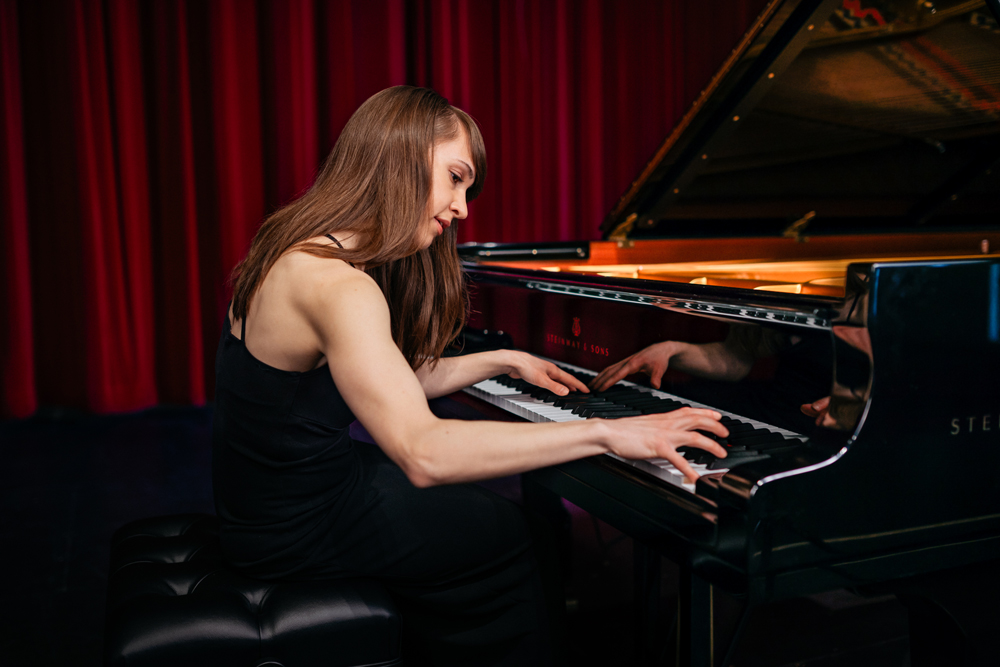
Andrea Pedro ('19 MMus) plays the University of Alberta's new Steinway Grand D piano
From a young age, Andrea Pedro has had a deep love for music - and self-improvement.
She was just four years old when her parents bought a piano and was all-too happy to sit on the bench and press the keys, like most young kids her age. But unlike most other kids, Pedro began to make up her own melodies and challenge herself to play the songs she was learning as fast as she possibly could.
Pedro's mother taught her the basics until the family could put her in lessons with a local teacher in their hometown of Terrace, B.C. With every passing year, she improved her practice and her passion for classical music blossomed. At 13, she stumbled upon a CD featuring the works of the late-Romantic composer, Sergei Rachmaninoff, who would become one of her all-time favourites. "I thought I'd play him because everyone says how hard it is," she admits. Small hands made it hard to learn the pieces, but Pedro persisted (naturally).
Although driven to play, Pedro insists she didn't get "serious" about piano until she reached the age of 16. At a time when many young musicians lose motivation, she began to practice tirelessly in anticipation of the town's annual music festival. While she loved playing for its own sake, she was strongly motivated by a desire to succeed.
"I'm a really competitive person and these two girls I knew, who were more advanced than me, were playing in the local competition," she says. "And I wanted to win." Convinced that the other musicians had more talent than she did, Pedro believed she could make up for this perceived shortcoming by working harder. After relentless practice, she did what she set out to do, earning several awards at the festival.
At 18, Pedro's piano career faced a turning point when she had to stop taking lessons for financial reasons. She began taking steps towards a more 'practical' career by studying science at a community college. "[A music] career isn't straightforward and it's difficult to make money," says Pedro.
But something drove her to continue playing, teacher or no teacher. Between college classes and shifts at her part-time cashier job, Pedro practiced for hours on end. Finally, two years later, she realized that she couldn't possibly pursue a university education in anything but music. "I realized I'd always wanted to do it." It would take another three years before Pedro would attend an undergraduate music program at Kwantlen Polytechnic University, during which time she'd spend many more solitary hours at the piano. "To this day, I'm surprised I was able to do that for so long with nobody to talk to [about music] for most of that time."
After earning her undergraduate music degree, Pedro didn't feel finished with academia. "I just wanted to learn more," she says. In 2017, she arrived at the University of Alberta to earn a Master of Music in Performance through the Faculty of Arts, which she will receive later this week when she crosses the stage of the Jubilee Auditorium during Spring Convocation 2019. Pedro's thesis: A 90-minute solo recital featuring five different works by Mozart, Schumann, Brahms, Louie, and Liszt.
Pedro says she isn't sure yet what the next phase of her music career will look like, but she's headed to Europe after convocation as a 2018 winner of a Johann Strauss Foundation Music Award. This is the second time Pedro has received the scholarship, which is administered through the Wirth Institute for Austrian and Central European Studies, and covers travel, accommodation, for students pursuing advanced musical study in Austria.
While the scholarship is entirely merit-based, she doesn't see it as validation of her ability but rather a valuable opportunity to improve her playing under the tutelage of master pianists. "I'm always thinking about how I can be better."